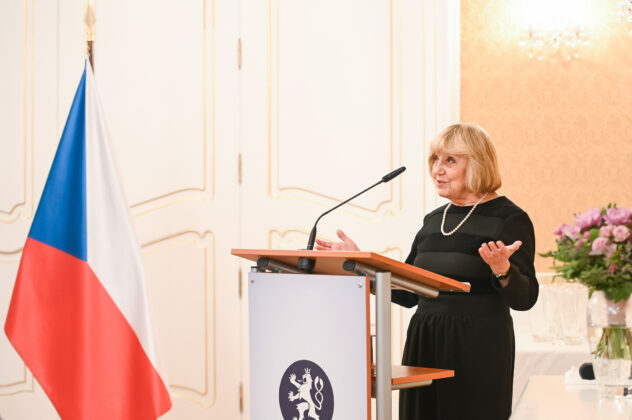Professor Olga Štěpánková from the Czech Institute of Informatics, Robotics and Cybernetics at CTU has received the Milada Paulová Award for her lifelong contribution to artificial intelligence. The award is presented by the Ministry of Education, Youth and Sports in cooperation with the National Contact Centre for Gender and Science of the Institute of Sociology of the Czech Academy of Sciences. Professor Štěpánková received the Milada Paulová Award from Education Minister Mikuláš Bek at a ceremonial event on November 4, 2025.
Since 2016, Prof. Štěpánková has been working at the Czech Institute of Informatics, Robotics and Cybernetics (CIIRC) at CTU, where she heads the Department of Biomedical Engineering and Assistive Technologies. Her long-term focus has been on applying artificial intelligence methods in medical diagnostics, processing complex and incomplete data, and designing assistive technologies that improve patient care. She collaborates with seven clinical institutions in the Czech Republic as well as the globally renowned Mayo Clinic in the United States. Her work bridges research, medicine, and modern technologies—fields that are now fundamentally shaping AI and its social impact.
“I deeply appreciate receiving the Milada Paulová Award and see it as recognition for all those I’ve had the opportunity to work with throughout my career. I consider it a great privilege that together we were able to build a free and inspiring creative environment—one that gave us the courage to aim high and the strength to achieve our goals,” said Professor Olga Štěpánková.
Prof. Štěpánková is one of the pioneers of artificial intelligence in the Czech Republic. After studying theoretical cybernetics at the Faculty of Mathematics and Physics at Charles University, she began her research career at CTU. There, in collaboration with Ivan M. Havel, she initially explored the use of mathematical logic in robotic action planning. Later, alongside her husband Petr Štěpánek, she researched properties of the declarative programming language PROLOG, tailored for AI tasks. She played a key role in launching systematic AI education at CTU, developing new study programs, and mentoring dozens of PhD candidates and hundreds of students. She was instrumental in founding the Department of Cybernetics at the Faculty of Electrical Engineering at CTU, which—thanks in part to her leadership as deputy head—grew into a European center of excellence and forged partnerships with top international institutions. Through her lifelong work, she helped build the foundation that allows Czech AI research to be internationally recognized today.
“I’ve had the honor of working with Olga Štěpánková for over thirty years—from the early days of AI projects at the Faculty of Electrical Engineering to the advancement of modern research at CIIRC CTU,” said CIIRC Scientific Director Prof. Vladimír Mařík. “She has always brought not just expertise to the team, but also an extraordinary ability to lead, mentor young colleagues, and seek the human meaning behind technology. Her approach to AI has always been both ethical and empathetic—and that’s why this recognition means so much to me personally.”
“Professor Štěpánková’s research shows how technology can truly improve people’s quality of life. With this award, we not only honor her scientific contributions but also send a message of support to all women pursuing careers in science,” said Education Minister Mikuláš Bek.
The Milada Paulová Award, named after the historian who became the first woman to lecture at a Czech university (1925) and later the first female professor in the country (1939), celebrates the achievements of outstanding Czech women researchers. Through this award, the Ministry of Education aims to inspire young women considering a scientific path and highlight the essential role women play across all fields of research.
Source of photos: MŠMT










